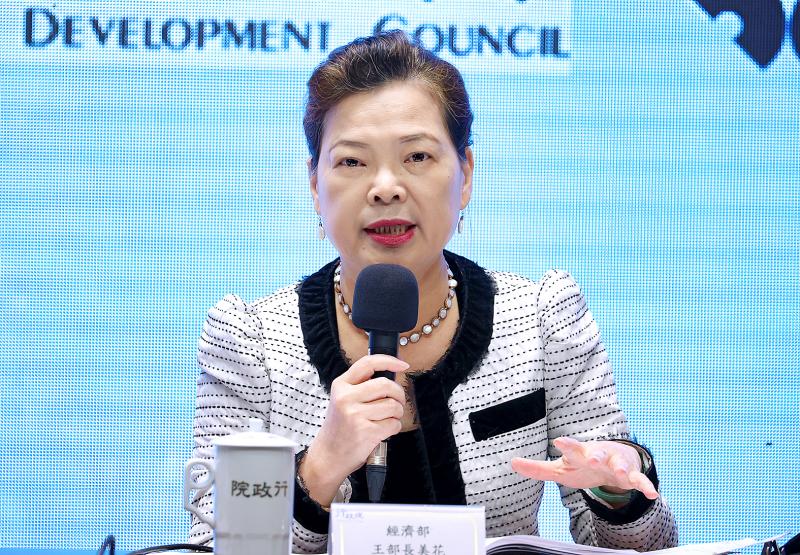Taiwan has submitted an application to join a Pacific trade deal, just days after China sent its own request to become a member of the agreement that was once pushed by Washington as a way to isolate Beijing and solidify US dominance in the region.
The Taiwanese application to join the Comprehensive and Progressive Agreement for Trans-Pacific Partnership (CPTPP) was sent to New Zealand, with a public announcement scheduled for as soon as this morning, a person familiar with the situation said.
New Zealand is the depositary nation for the deal, and is to forward the application to the other 10 nations.

Photo: CNA
The New Zealand Ministry of Foreign Affairs did not reply to an e-mail requesting comment.
Deputy Minister of Economic Affairs Chen Chern-chyi (陳正祺) yesterday confirmed the Bloomberg report, saying that Minister of Economic Affairs Wang Mei-hua (王美花) would make a public announcement this morning, the Central News Agency reported.
Taiwan has free-trade deals with two of the members — New Zealand and Singapore — and has been working toward joining the trade agreement for years, with President Tsai Ing-wen (蔡英文) making it a key goal for her final term in office.
However, China opposes any move to deal openly with Taiwan, which would make discussions between Beijing, Taipei and the 11 member nations difficult.
Tsai’s government has made building support among democratic allies in the region a crucial part of its efforts to counter rising pressure from Beijing.
This has included closer ties with CPTPP members such as Australia, which is in the midst of a trade dispute with China, and Japan, which is a key trading partner and the largest economy in the CPTPP.
Last month, lawmakers from Japan’s ruling party backed Taiwan’s entry into the deal.

The Taiwanese passport ranked 33rd in a global listing of passports by convenience this month, rising three places from last month’s ranking, but matching its position in January last year. The Henley Passport Index, an international ranking of passports by the number of designations its holder can travel to without a visa, showed that the Taiwan passport enables holders to travel to 139 countries and territories without a visa. Singapore’s passport was ranked the most powerful with visa-free access to 192 destinations out of 227, according to the index published on Tuesday by UK-based migration investment consultancy firm Henley and Partners. Japan’s and

NATIONAL SECURITY THREAT: An official said that Guan Guan’s comments had gone beyond the threshold of free speech, as she advocated for the destruction of the ROC China-born media influencer Guan Guan’s (關關) residency permit has been revoked for repeatedly posting pro-China content that threatens national security, the National Immigration Agency said yesterday. Guan Guan has said many controversial things in her videos posted to Douyin (抖音), including “the red flag will soon be painted all over Taiwan” and “Taiwan is an inseparable part of China,” while expressing hope for expedited “reunification.” The agency received multiple reports alleging that Guan Guan had advocated for armed reunification last year. After investigating, the agency last month issued a notice requiring her to appear and account for her actions. Guan Guan appeared as required,

Japan and the Philippines yesterday signed a defense pact that would allow the tax-free provision of ammunition, fuel, food and other necessities when their forces stage joint training to boost deterrence against China’s growing aggression in the region and to bolster their preparation for natural disasters. Japan has faced increasing political, trade and security tensions with China, which was angered by Japanese Prime Minister Sanae Takaichi’s remark that a Chinese attack on Taiwan would be a survival-threatening situation for Japan, triggering a military response. Japan and the Philippines have also had separate territorial conflicts with Beijing in the East and South China

A strong cold air mass is expected to arrive tonight, bringing a change in weather and a drop in temperature, the Central Weather Administration (CWA) said. The coldest time would be early on Thursday morning, with temperatures in some areas dipping as low as 8°C, it said. Daytime highs yesterday were 22°C to 24°C in northern and eastern Taiwan, and about 25°C to 28°C in the central and southern regions, it said. However, nighttime lows would dip to about 15°C to 16°C in central and northern Taiwan as well as the northeast, and 17°C to 19°C elsewhere, it said. Tropical Storm Nokaen, currently